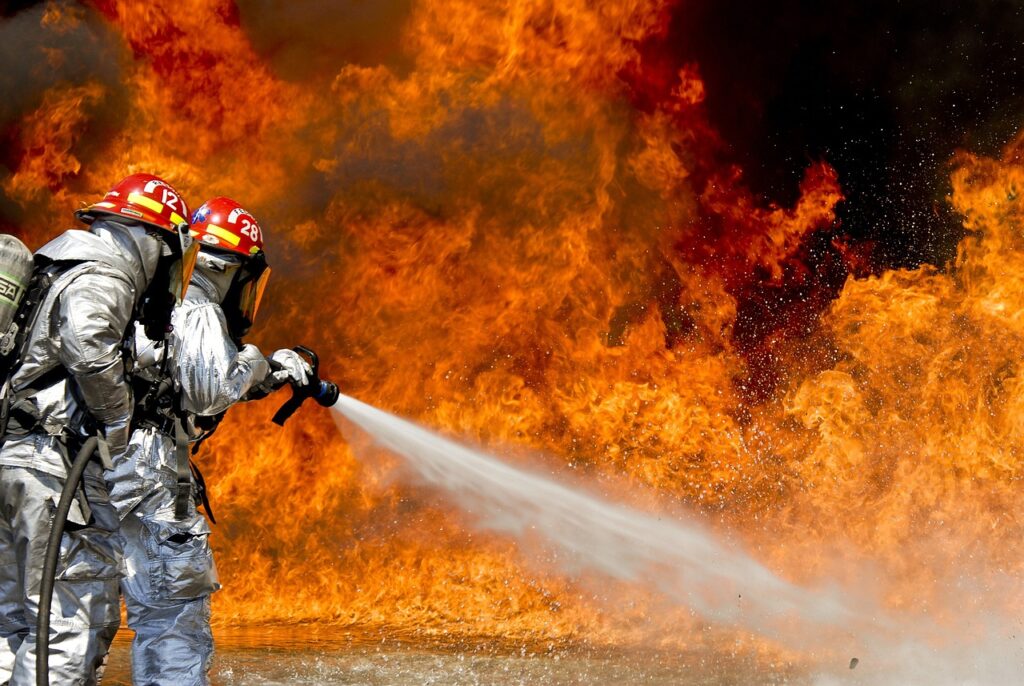Kathryn Clay, president of the ILTA, explores how the ILTA is influencing policy to support a reasonable transition to new firefighting foams
Many of the bulk liquid products handled by International Liquid Terminal Association (ILTA) member companies demand special precautions due to their flammable properties. While significant fire events at terminals are rare, responsible facility management demands that terminal operators maintain capabilities to respond quickly and effectively to fires when they do occur.
Recently, a class of chemicals called per- and polyfluoroalkyl substances, or PFAS, has drawn the attention of news outlets and policymakers.
Historical Firefighting 
For decades, the tank storage industry has relied upon aqueous film-forming foams (AFFF) to protect communities, workers, commodities, and infrastructure from potentially dangerous fire hazards and environmental risks. Because of the unique characteristics of PFAS, jurisdictions across the country have been able to use foams to control fires and mitigate spills and air pollution.
In an editorial in Roll Call, Senator Shelly Moore Caputo, (R-WV) argued that Congress should deliver solutions that reduce risks posed by PFAS in a scientific, bipartisan, and responsible manner. Politico has been writing about the tricky business of assigning liability for PFAS contamination.
What are the Alternatives?
ILTA recognizes the acute policymaking challenges posed by this set of issues, and respects the vitally important work that the US Environmental Protection Agency (EPA) is undertaking to address PFAS through the agency’s PFAS Council and the PFAS Strategic Roadmap. Moreover, ILTA members are committed to moving away from PFAS as quickly as practicable, while remaining dedicated to a safe, orderly, and industry-wide transition.
ILTA firmly supports a safe, strategic, well-managed transition to fluorine-free, or PFAS-free, firefighting foams, while ensuring public and worker safety. ILTA is working with the Natural Resources Defense Council and the International Association of Firefighters on legislation to provide a safe and achievable path away from PFAS-based firefighting foams nationwide.
Transitioning the liquid terminal industry’s existing stocks of firefighting foam to fluorine-free foams will require collaboration between regulators, the public and industry stakeholders, including terminal owners and operators, firefighters, foam manufacturers, and disposal vendors. ILTA also recognizes that significant barriers must be addressed before the industry can achieve a complete, industry-wide transition to safer alternatives.
Transitioning Away From PFAS
Alternative foams are not a drop-in substitute for AFFF. There are important research, development, and deployment, training, disposal, and other activities that policy makers and other stakeholders must strategically think through in developing a transition timeline. For example, to be effective, the replacement products may require higher volumes of foam, additional labor, or different application techniques and equipment. Additionally, there are potential safety risks associated with a transition that fails to provide time needed for coordination between these stakeholders for testing, training, equipment replacement, disposal, and other critical activities.
Terminal operators rely on the principle of mutual aid to ensure they can provide adequate responses to incidents. During an event, neighboring facilities, sometimes from different states may provide foam, equipment, or fire-fighting personnel.
Importantly, due to the foam flow rates and potential contamination concerns, equipment prepared to deliver PFAS containing foams cannot be used to deliver fluorine-free foams, and vice versa. For the largest fires, foam may be provided from other facilities across the region or even from across the country.
This inherent interdependence of terminals makes it necessary to allow additional time for the entire industry to move together to eliminate PFAS containing foams. Conflicting PFAS policies at the state level can make it hard for fire responders to cross state lines to help fight fires and spills, as is sometimes required.
Superfund & Liability
ILTA supports legislation that would properly address liability for PFAS pollution. The association believes that, in its current form, the Comprehensive Environmental Response, Compensation, and Liability Act (CERCLA or ‘Superfund’), is the wrong approach to address contamination resulting from past use of PFAS-based fire-fighting foams. The ILTA asks Congress to give EPA additional use of such foams in the near term may represent one of few effective tools for controlling the fire and preventing serious threats to public health, welfare or the environment,’ the ILTA wrote.
Furthermore, it argued for ‘an exclusion from CERCLA liability for the use of AFFF that contain PFAS in response to a bulk liquid terminal fire or similar emergency.’ Legislation offered by Wyoming Senator Cynthia Lummis (R-Wyo.) would amend the CERCLA definition of ‘owner or operator’ to explicitly exclude owners or operators acting in good faith in accordance with regulatory requirements to use and train with PFAS-based firefighting foams.
Foam Disposal
More than 2,000 bulk liquid terminal facilities, dispersed across the country, could soon be unfairly burdened by Superfund liability as a result of these past practices. Today, there is no universally accepted method of safe disposal of PFAS-based firefighting foams. Incineration of PFAS chemicals is banned in several states and a moratorium on PFAS incineration is in place at Department of Defense facilities. While new technologies to destroy PFAS in firefighting foams have recently entered the marketplace, more work is needed to validate these technologies for all legacy foams.
A Path Forward
Bulk liquid terminal owners and operators are stewards of the nation’s environment, and terminals operated by ILTA members actively support, and engage in, a wide range of best practices to ensure sustainability and safety.
Challenges are never-ending, including the rare circumstance in which a significant fire occurs at terminal facilities. For decades, the tank storage industry has relied upon PFAS-containing foam to protect communities, workers, commodities, and infrastructure from potentially dangerous fire hazards and environmental risks from fire events.
Bulk liquid terminal operators have acted in good faith to carry out their responsibilities and obligations under law. Overall, ILTA advocates for clear national standards to avoid a piecemeal approach across different states. A coordinated transition to fluorine-free firefighting foams is essential to safe incident response across the liquid terminal industry.
ILTA firmly believes that the inflexible regulatory approach possible under the current form of CERCLA is not in the best interests of the US economy or the countless customers who are ultimately served well by the nation’s bulk terminal owners and operators. ILTA stands ready to partner with EPA on these important issues and to lead the industry work to discontinue use of these products.
For more information:
The ILTA is holding its annual conference and trade show on 6-8 May 2024 in Houston, Texas. Tank Storage Magazine is proud to be the official media partner for this event.









